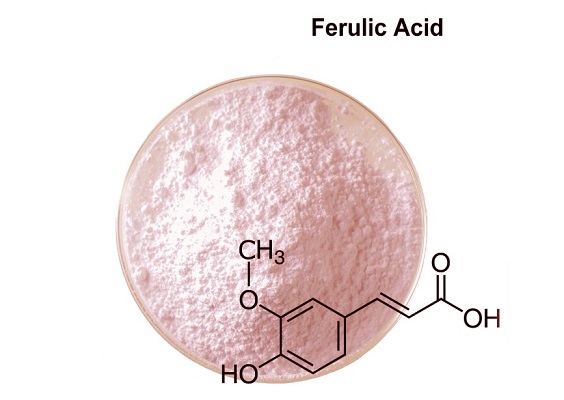Nikhil Prasad Fact checked by:Thailand Medical News Team Feb 25, 2025 1 month, 2 weeks, 6 days, 18 hours, 53 minutes ago
Medical News: Cancer remains a significant global health threat, with millions of new cases and deaths recorded each year. Researchers continue to explore new and innovative treatments to combat the disease, and one promising natural phytochemical compound that has garnered attention is ferulic acid. Found in fruits, vegetables, and grains, ferulic acid is a type of polyphenol with powerful antioxidant and anti-inflammatory properties. Polish Scientists from Poznań University of Medical Sciences, Łukasiewicz Research Network - Industrial Chemistry Institute, and Warsaw University of Technology have conducted a comprehensive review on how ferulic acid influences different types of cancer, including breast, cervical, prostate, and colorectal cancers. This
Medical News report highlights the key findings of their research.
 Potential Benefits of Ferulic Acid in Fighting Malignant Tumors
How Ferulic Acid Works Against Cancer
Potential Benefits of Ferulic Acid in Fighting Malignant Tumors
How Ferulic Acid Works Against Cancer
Ferulic acid plays a significant role in suppressing cancer growth through multiple mechanisms. It can trigger programmed cell death, known as apoptosis, in cancer cells by activating crucial enzymes such as p53, p21, and caspases. Additionally, it inhibits tumor cell invasion and the formation of new blood vessels, which are essential for tumor growth and metastasis. The compound also disrupts cancer cell cycles, preventing them from proliferating uncontrollably. Moreover, ferulic acid interacts with various signaling pathways, including PI3K/AKT/mTOR, Notch, and Wnt, all of which are critical for cancer progression. These interactions ultimately lead to reduced tumor survival and increased vulnerability to standard chemotherapy treatments.
Ferulic Acid and Breast Cancer Treatment
Breast cancer is the most commonly diagnosed cancer worldwide, with cases expected to rise in the coming decades. Standard treatments, including chemotherapy, often come with severe side effects and risks of resistance.
Studies have shown that ferulic acid enhances the effects of conventional breast cancer treatments by increasing drug cytotoxicity while reducing resistance. Researchers found that ferulic acid significantly reduces breast cancer cell viability, induces apoptosis, and inhibits metastasis. When combined with chemotherapy drugs like cisplatin, paclitaxel, doxorubicin, and tamoxifen, ferulic acid enhances their effectiveness while minimizing adverse effects. New studies also suggest that ferulic acid, when encapsulated in nanoparticles, can improve drug delivery and boost cancer treatment outcomes.
Impact on Cervical Cancer
Cervical cancer remains one of the leading causes of cancer-related deaths in women. Human papillomavirus (HPV) infection is the primary risk factor, but lifestyle choices and genetic factors also contribute to its development. Studies on cervical cancer cell lines have demonstrated that ferulic acid reduces cell viability, promotes apoptosis, and induces cell cycle arrest at the G0/G1 phase. The compound downregulates essential proteins involved in cancer progression, including MMP-9 and Bcl-2, while upregulating tumor suppressors such as p5
3 and p21. These findings indicate that ferulic acid has the potential to complement existing cervical cancer therapies.
Promising Results for Prostate Cancer
Prostate cancer is one of the most commonly diagnosed cancers in men, with a rising global incidence. A case-control study conducted in Italy revealed that men with prostate cancer had significantly lower levels of ferulic acid compared to healthy individuals. In laboratory studies, ferulic acid was found to suppress prostate cancer cell growth by influencing genes that regulate the cell cycle and apoptosis. Interestingly, when combined with δ-tocotrienol, a vitamin E derivative, ferulic acid exhibited an even stronger anti-cancer effect, leading to enhanced tumor cell death and cell cycle arrest. These findings suggest that ferulic acid could be a valuable addition to prostate cancer treatment strategies.
The Role of Ferulic Acid in Colorectal Cancer
Colorectal cancer is one of the most common and deadly forms of cancer, largely influenced by diet and lifestyle choices. Ferulic acid has been studied for its potential in reducing colorectal cancer risk and inhibiting tumor progression.
Research on animal models has shown that ferulic acid prevents the formation of aberrant crypt foci, the earliest precursors of colorectal cancer. Additionally, ferulic acid reduces cancer cell viability and suppresses the expression of the epidermal growth factor receptor (EGFR), a key protein involved in colorectal cancer development. Some studies also suggest that combining ferulic acid with other plant-derived compounds, such as resveratrol, may further enhance its anti-cancer properties.
Challenges and Future Perspectives
Despite its promising potential, ferulic acid faces some challenges in clinical applications. One major limitation is its poor bioavailability, as it is not easily absorbed and metabolized in the human body. Researchers are exploring advanced delivery methods, such as nanoparticles and polymer-based systems, to enhance its effectiveness. Future studies and clinical trials are necessary to confirm its safety, optimal dosage, and long-term benefits. Additionally, scientists are investigating whether ferulic acid can be effectively used in personalized cancer treatment approaches.
Conclusion
Ferulic acid exhibits remarkable anti-cancer properties by influencing multiple cellular pathways, inhibiting tumor growth, and enhancing the effectiveness of standard cancer treatments. Studies have demonstrated its potential in treating breast, cervical, prostate, and colorectal cancers, either alone or in combination with conventional therapies. Although challenges remain, advancements in drug delivery methods and further clinical research may pave the way for ferulic acid to become a valuable component in future cancer treatment regimens.
The study findings were published in the peer-reviewed journal: Molecules.
https://www.mdpi.com/1420-3049/30/5/1018
For the latest Cancer News, keep on logging to Thailand
Medical News.
Read Also:
https://www.thailandmedical.news/news/an-introduction-to-mirtrons-the-tiny-rna-molecules-that-play-a-role-in-cancer
https://www.thailandmedical.news/news/thailand-doctors-discover-potential-cancer-treatment-using-apigenin
https://www.thailandmedical.news/news/breakthrough-study-reveals-legume-derived-peptides-as-potential-cancer-fighters
https://www.thailandmedical.news/articles/cancer
https://www.thailandmedical.news/articles/herbs-and-phytochemicals
https://www.thailandmedical.news/pages/thailand_doctors_listings
